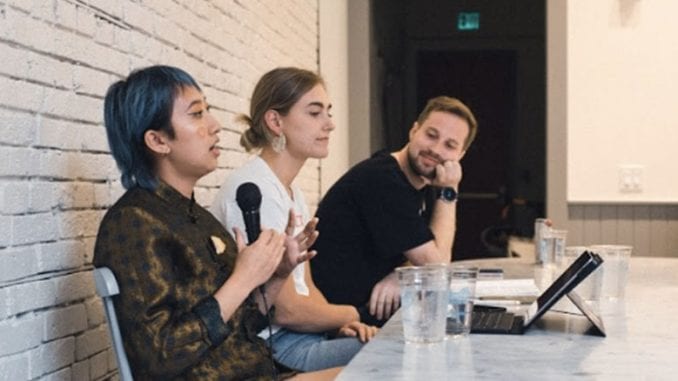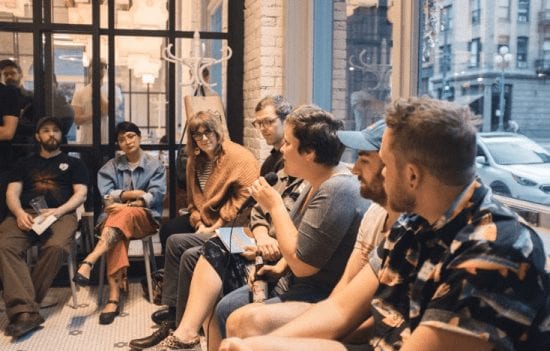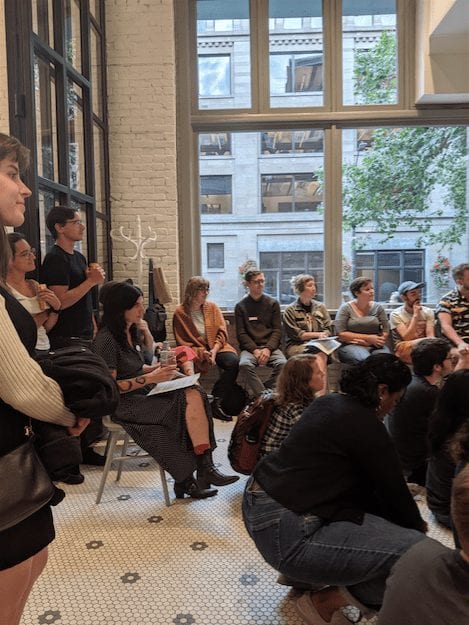
The Instagram movement recently made its IRL debut in Seattle to discuss its mission and facilitate dialogue on workers’ rights.
BY MARK VAN STREEFKERK
BARISTA MAGAZINE ONLINE
Cover photo by Dylan Patty
Members of Coffee at Large (CAL) hosted their first-ever event at General Porpoise in Seattle’s Pioneer Square on August 9. Aside from a “What Are Labor Rights?” talk during Coffee People Zine’s release tour in Portland, the Seattle event—titled “Get To Know Coffee At Large”—was the group’s true public debut, having been solely an Instagram presence since the former Slate Coffee employees’ June 22 walkout.

CAL seeks to shed light on workplace injustice in the coffee industry, and has recently become an important resource for workers and businesses. The open conversation was facilitated by Tatiana Benitez, and included Felix Tran, Rachel Hopke, and Jason Beutler. Café owners, baristas, and customers from local cafés were in attendance. Stickers and pins with the CAL logo, and #coffeetoo‘s Know Your Rights guide as well as their suggested Code of Conduct, were also available for donations.
Felix started the event by recapping the Slate Coffee walkout earlier this summer, which inspired CAL; CAL’s impact on his personal life; and how to work for change within the coffee community. “These are small-owned businesses and we understand that. And we understand when folks can’t give out raises left and right because you’re a small-owned business. There are other ways to incentivize baristas. Money isn’t the only currency for a barista,” Felix said.
He encouraged café owners to promote coffee education or support passion projects for their workers, but said the bare minimum is fostering open communication. “[It] is the least expensive thing, and it’s the most effective thing, so we should invest in that,” he said.

Jason followed by sharing his research on labor rights and workplace organizing. “You don’t get what you deserve. You get what you negotiate,” he said, emphasizing that many workers—himself included—are used to “gaslighting” themselves, or masking their true feelings, which is how grievances can go on unchecked. Jason encouraged baristas to get to know their work team, talk about issues, see if they can be resolved proactively, and document instances of injustice. He cited the Industrial Workers of the World and Democratic Socialists of America as the inspiration for helping CAL organize. “If you don’t like socialism, that’s fine, but no capitalists are working for workers’ rights so you have to get on board,” he said.
For Rachel, being part of Seattle’s coffee scene evokes a responsibility to improve the way workers are treated. She said one of the barriers to effective communication within the industry is the pressure of being employed at-will. “Business owners need to make space for conversation. A reason that conversation isn’t able to be had is that there’s all this pressure and stress around at-will employment. You can’t speak up if you feel like you’re going to be fired. Being able to learn how to relieve that pressure is going to be how you make space for that conversation. That’s one of the only ways to have a healthy and trusting environment,” she said.

One person from the audience asked how white cisgender men can be better allies to marginalized folks in coffee. “Empathy goes a really long way,” Tatiana answered. “If you really want to be an ally you just gotta f**king listen. Just listen. That’s the first step. If someone comes to you and they’re like, ‘Hey you’re making me uncomfortable,’ you don’t get to tell them that you’re not. You just need to give them the platform.”
Jason also suggested: “I also think that cis-white dudes should do their best to avoid positions of power in the industry. Because the industry won’t change if things stay the same. That doesn’t mean quit your job, but don’t try to be the one at the top.”
Along with their social media outreach, CAL is compiling resources to empower the coffee community, working on a website, starting the process to becoming a nonprofit, and assembling plans for a future podcast. How can you support Coffee at Large? Donate to their GoFundMe, or “another way is to keep having these conversations in your workplace,” Rachel said.

ABOUT THE AUTHOR
Mark Van Streefkerk is Barista Magazine’s social media content developer and a frequent contributor. He is also a freelance writer, social media manager, and novelist based out of Seattle. If Mark isn’t writing, he’s probably biking to his favorite vegan restaurant. Find out more on his website.
